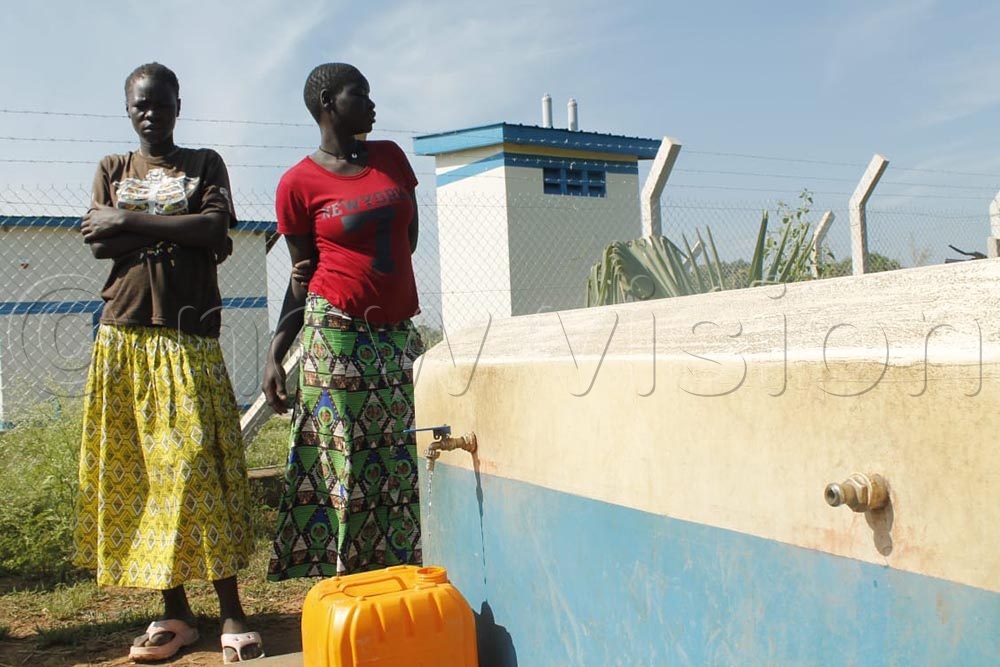Govt water projects break down over poor usage
“We are moving from simply installing water systems to securing and sustaining them,” Muhangi says. “We are strengthening water user committees to report vandalism on time and work closely with our teams on operations and maintenance.”
Christine Pangisa, the senior woman teacher at Kei Seed Secondary School, says access to clean water has improved both life and learning. (Credit: Ibrahim Ruhweza)
WEST NILE - Due to water scarcity in many parts of the country, the Government embarked on sinking boreholes and extending water systems to various communities.
With support from UK Export Finance, the Government has so far constructed over 100 domestic water points across Uganda, benefiting more than two million people. Notable among these are projects in the West Nile districts of Maracha and Yumbe.
However, in these areas, many locals seem not to have understood the importance of protecting and using clean water responsibly.
In Ololo Village, Yumbe District, one of the multimillion-shilling domestic water projects handed over to locals in 2024 has already been vandalised.
By the time of a visit on November 26, 2025, New Vision Online found one of the taps vandalised. According to concerned residents, this means water becomes scarce even when the system itself is in good working condition.
A Fifteen-year-old pregnant girl, who had come to collect water, found the system barely functioning.
“When the tap is working well, a jerrycan can get full in about a minute,” she says.
Kassim Matata Aroma, the councillor for Akia Parish in Keei sub-county, says the Government handed over a fully functioning system and tasked the community with maintaining it.
“The caretaker blocks the water because he is not paid. He has not been paid for three months. Each month, he is supposed to earn shillings 120,000,” he says.
Aroma says he is expected to convene village meetings to mobilise community contributions to pay the caretaker. He notes that the vandalised tap has already affected over 3,000 Awoba and Bizee parishes residents, who depend on the Ololo water point since their areas have none.
In Maracha district, similar incidents have left many wondering what went wrong. Reduced water pressure means locals wait for long hours, and those who walk long distances struggle even more.
With such frustrations, many people are returning to stream water, posing serious health risks.
However, some water taps located in school premises are functioning well and transforming lives.
Christine Pangisa, the senior woman teacher at Kei Seed Secondary School, says access to clean water has improved both life and learning.
The school, which started in January 2016 with only 25 students, struggled to grow until 2024 when the Ministry of Water and Environment contracted Nexus Green to extend water to the compound. It now has 810 learners.
“We no longer struggle for water. Government has solved some of our problems,” she says.
Pangisa adds that learners’ health, especially for girls, has greatly improved. However, she notes that the entire project has only 10 taps, which are not enough. One tap currently serves about three parishes Awoba and Bizee with a combined population of about 3,000 people.
With such congestion, she fears more taps may get damaged.
Village health team member Noah Achikule says community health standards have improved. He notes that from 2020 to 2023, about 75% of residents suffered from waterborne diseases, but in 2025, the number has dropped to 23%, which he calls progress.
In Ololo Village, Yumbe District, one of the multimillion-shilling domestic water projects handed over to locals in 2024 has already been vandalised. (Credit: Ibrahim Ruhweza)
Technocrats respond
Adam Seennyunja, Community Liaison Officer for North and West Nile at Nexus Green Limited, says vandalism of rural water systems is a critical issue that must be addressed by strong water source and user committees.
“Often, unscrupulous water users make decisions that hurt the whole system,” he says.
“These acts include breaking taps, cutting pipes for brick making, or diverting water for irrigation. The worst of all is the theft of solar panels and pumps.”
He says modern water management relies on vibrant water user committees that regularly discuss issues affecting their systems.
Communities are expected to enact bylaws with penalties for vandalism and agree on user fees to sustain the systems.
“With a levy charged to every user, the collections can be used to pay the operator, repair broken parts, replace components, and save for emergencies,” he says.
Failure to collect such fees, he warns, renders systems inefficient, especially when breakdowns are caused by vandalism.
Noel Muhangi, Senior Public Relations Officer at the Ministry of Water and Environment, says vandalising water taps is not just destroying property it is economic sabotage and a direct attack on public health.
Reversed progress
Muhangi notes that every shilling spent repairing vandalised pipes is money taken away from extending water to villages that have none.
“It slows down our National Development Plan targets for universal water access,” he says.
When a tap is broken, he adds, families are forced to return to contaminated wells and streams.
“The vandal is not just stealing metal; they are endangering the lives of children and the elderly.”
Muhangi says the ministry is doubling efforts in community sensitization.
“Infrastructure cannot survive if the community sees it as ‘government property’ rather than ‘our property.’ We are helping them understand that these projects belong to them,” he says.
Way forward
“We are moving from simply installing water systems to securing and sustaining them,” Muhangi says. “We are strengthening water user committees to report vandalism on time and work closely with our teams on operations and maintenance.”
Cost of repair
According to Ssenyunja, a tap is shillings 15,000 plus the cost of a local plumber is between sh15,000 to sh20,00, which can total to sh30,000.